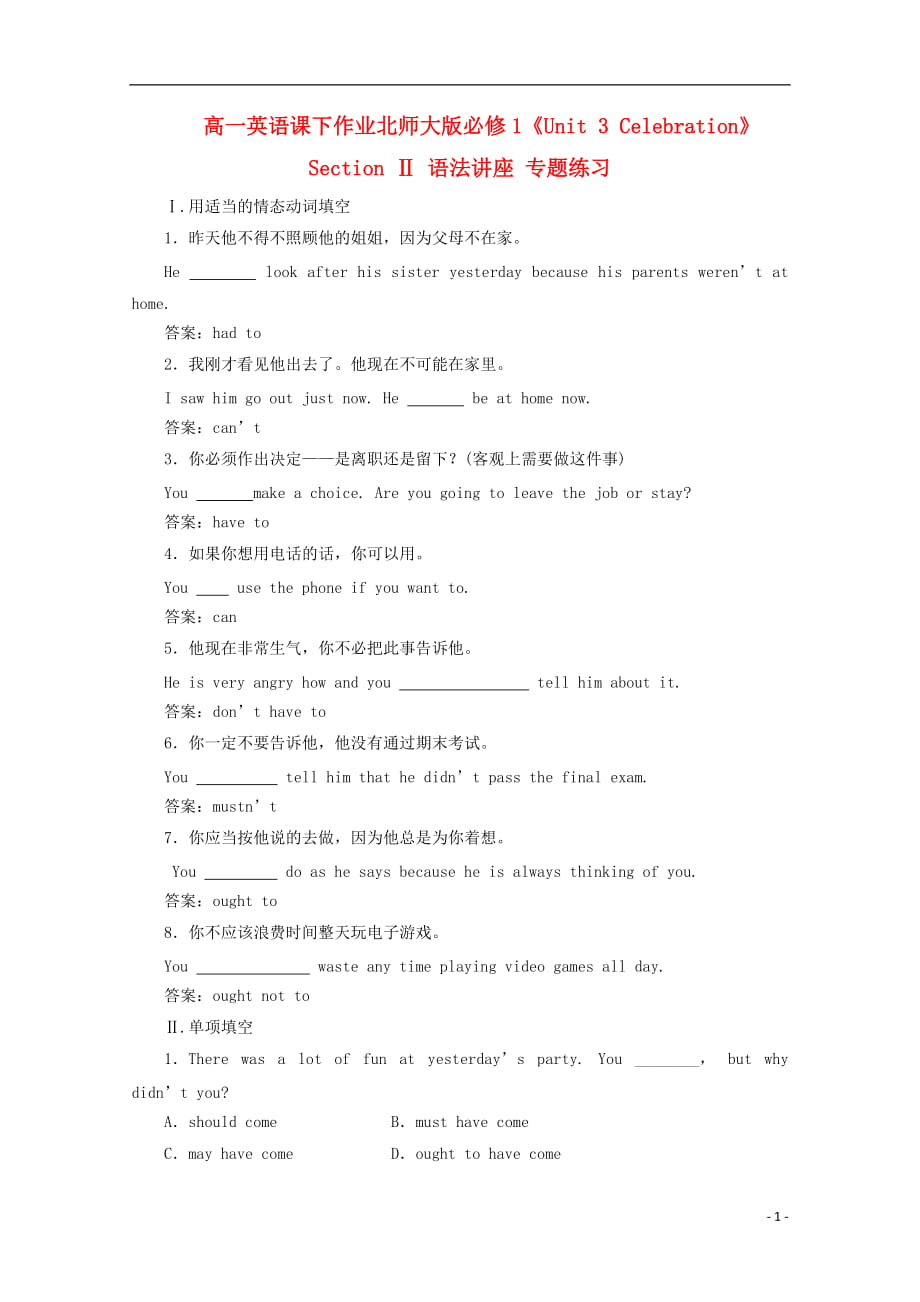《高中英語《Unit 3 Celebration》Section Ⅱ 語法講座 專題練習(xí)課下作業(yè) 北師大版必修1》由會(huì)員分享�,可在線閱讀,更多相關(guān)《高中英語《Unit 3 Celebration》Section Ⅱ 語法講座 專題練習(xí)課下作業(yè) 北師大版必修1(3頁珍藏版)》請?jiān)谘b配圖網(wǎng)上搜索。
1���、
高一英語課下作業(yè)北師大版必修1《Unit 3 Celebration》Section Ⅱ 語法講座 專題練習(xí)
Ⅰ.用適當(dāng)?shù)那閼B(tài)動(dòng)詞填空
1.昨天他不得不照顧他的姐姐��,因?yàn)楦改覆辉诩摇?
He look after his sister yesterday because his parents weren’t at home.
答案:had to
2.我剛才看見他出去了��。他現(xiàn)在不可能在家里���。
I saw him go out just now. He be at home now.
答案:can’t
3.你必須作出決定——是離職還是留下?(客觀
2����、上需要做這件事)
You make a choice. Are you going to leave the job or stay?
答案:have to
4.如果你想用電話的話,你可以用���。
You use the phone if you want to.
答案:can
5.他現(xiàn)在非常生氣����,你不必把此事告訴他���。
He is very angry how and you tell him about it.
答案:don’t have to
6.你一定不要告訴他���,他沒有通過期末考試。
You
3、 tell him that he didn’t pass the final exam.
答案:mustn’t
7.你應(yīng)當(dāng)按他說的去做�����,因?yàn)樗偸菫槟阒搿?
You do as he says because he is always thinking of you.
答案:ought to
8.你不應(yīng)該浪費(fèi)時(shí)間整天玩電子游戲���。
You waste any time playing video games all day.
答案:ought not to
Ⅱ.單項(xiàng)填空
1.There was a lot of fun at
4��、 yesterday’s party. You ________����, but why didn’t you?
A.should come B.must have come
C.may have come D.ought to have come
解析:考查情態(tài)動(dòng)詞����。后句句意:你本應(yīng)該來的,但是為什么沒來呢��? ought to have done 過去本應(yīng)該做某事(卻未做)�����,故選D�����。
答案:D
2.I haven’t found my money. Where ________ it be?
A.must B.can
C.may D.has t
5��、o
解析:句意:我找不到錢�����?��?赡芊拍膬毫四?����? can 用在疑問句或否定句中����,表示“可能”���。 了
答案:B
3.The fire spread through the hotel very quickly, so I ________ leave there.
A.had to B.would
C.could D.might
解析:句意:大火很快蔓延到了整個(gè)賓館��,所以我不得不離開那里��。 have to “不得不”����;would “愿意”;could“能夠”�����;might“有可能”����。
答案:A
4.— Sorry to trouble you, but ____
6、____ I ask a personal question?
— No problem.
A.must B.ought
C.could D.should
解析:問句句意:很抱歉打擾你�����,我可以問一個(gè)私人問題嗎�����? could 在此表示委婉客氣的說法�����,不是 can 的過去式���。
答案:C
5.You don’t have to know the name of the author. You ________ find the book by the title.
A.can B.need
C.must D.would
解析:考查情
7、態(tài)動(dòng)詞�����。句意:你不必知道作者的名字,你能通過題目找到這本書����。 can “可以�����,能夠”�,故選A。
答案:A
6.We hope that as many people as possible ________ join us for the picnic tomorrow.
A.need B.must
C.should D.can
解析:根據(jù)句意確定答案����,此處的can也是表示可能性。
答案:D
7.— Is it necessary to look up every new word when I come across it in reading?
— N
8�����、o. You ________����, because you are likely to guess the meaning from the context.
A.can’t B.mustn’t
C.don’t have to D.ought not to
解析:句意:“當(dāng)我閱讀時(shí)有必要一遇到生詞就查字典嗎?”“不�����,沒必要,因?yàn)槟阌锌赡軓奈恼聝?nèi)容猜測出意思來”��。 don’t have to = needn’t “沒必要”�����;can’t “不可能”��;mustn’t “一定不要����,絕對不行”,表示嚴(yán)厲禁止�;ought not to“不應(yīng)該”。
答案:C
8.— What d
9�����、o you think we can do for our aged parents?
— You ________ do anything except that you visit them as often as possible.
A.don’t have to B.oughtn’t to
C.mustn’t D.shouldn’t
解析:句意:“你認(rèn)為我們應(yīng)該為年邁的父母做些什么��?”“除了盡可能經(jīng)常地去看他們外����,你不必要做什么��?�!?don’t have to “不必”����;oughtn’t to“不應(yīng)該”��;mustn’t “絕對不”����;shouldn’t “不應(yīng)該”���。
答案:A
- 3 -
 高中英語《Unit 3 Celebration》Section Ⅱ 語法講座 專題練習(xí)課下作業(yè) 北師大版必修1
高中英語《Unit 3 Celebration》Section Ⅱ 語法講座 專題練習(xí)課下作業(yè) 北師大版必修1

